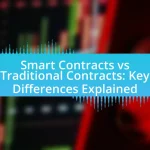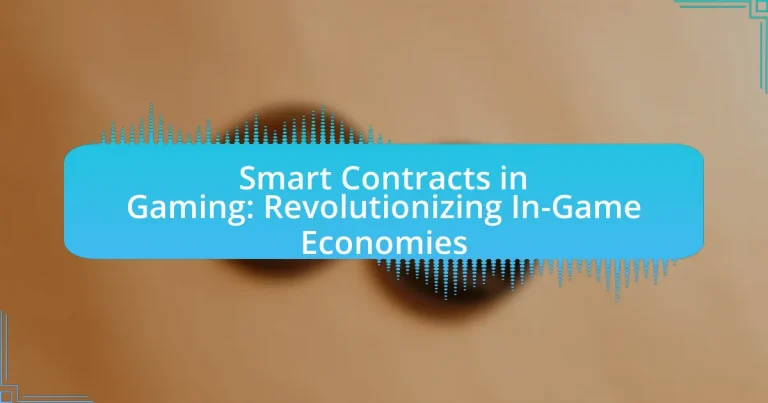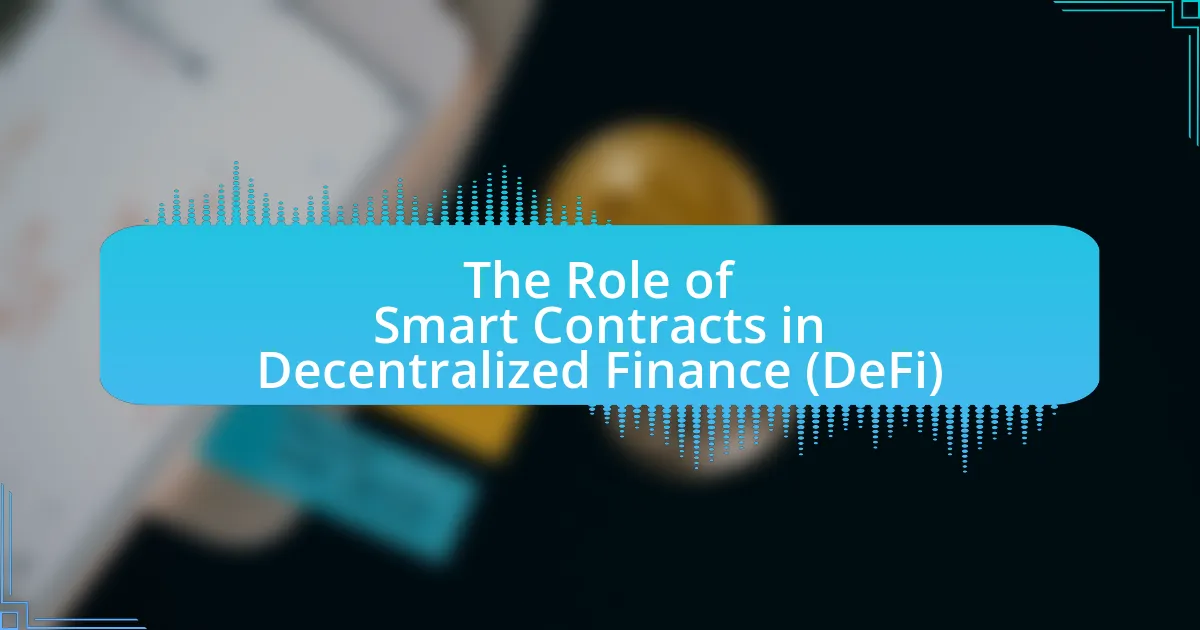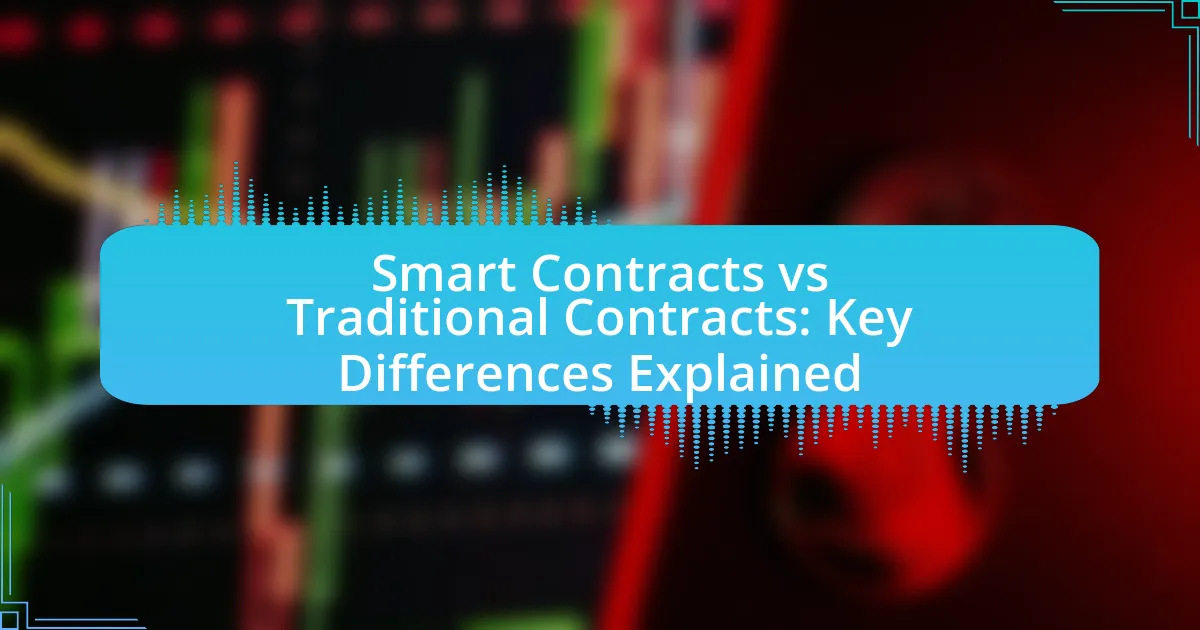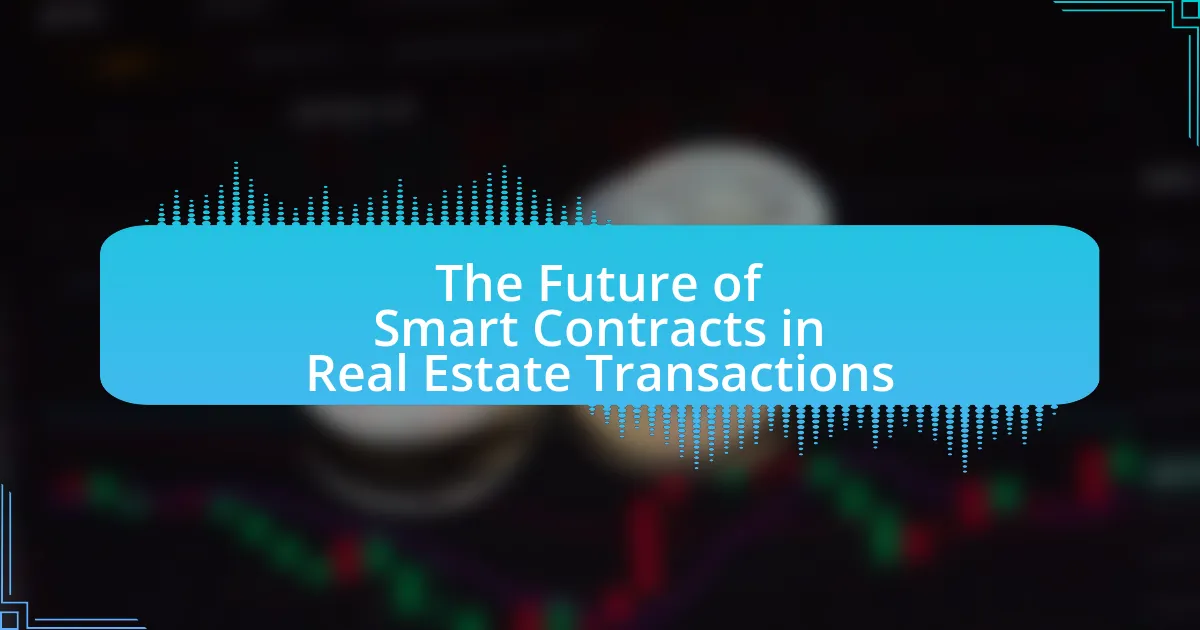Smart contracts in gaming are self-executing agreements coded on blockchain technology, enabling automated and secure transactions within gaming ecosystems. They enhance in-game asset ownership, allowing players to trade, buy, or sell items without intermediaries, thereby increasing transparency and reducing fraud. Key components include automation, security, and programmability, which streamline in-game economies and foster player engagement. The article explores how smart contracts transform traditional gaming economies, address issues of trust and ownership, and introduce new economic models such as play-to-earn gaming. Additionally, it discusses the implications for developers and players, highlighting best practices for implementing secure and efficient smart contracts in gaming environments.
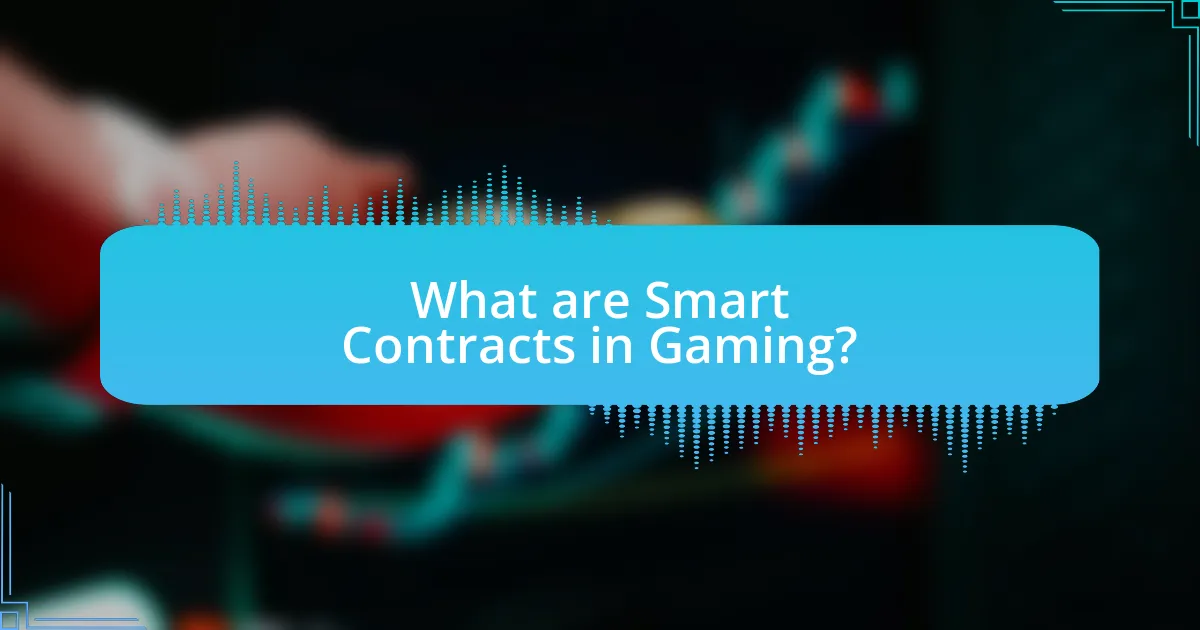
What are Smart Contracts in Gaming?
Smart contracts in gaming are self-executing contracts with the terms of the agreement directly written into code, enabling automated transactions and interactions within games. These contracts facilitate secure and transparent in-game asset ownership, allowing players to trade, buy, or sell items without intermediaries. For instance, blockchain technology underpins many smart contracts, ensuring that ownership records are immutable and verifiable, which enhances trust among players. The use of smart contracts can significantly streamline in-game economies by reducing fraud and increasing efficiency in transactions.
How do Smart Contracts function within gaming ecosystems?
Smart contracts function within gaming ecosystems by automating and enforcing the rules of gameplay and transactions without the need for intermediaries. These self-executing contracts are coded on blockchain platforms, allowing for transparent and tamper-proof interactions between players and game developers. For instance, in games that utilize non-fungible tokens (NFTs), smart contracts can manage ownership transfers, ensuring that players retain control over their in-game assets. This technology enhances trust and security, as all transactions are recorded on the blockchain, making them verifiable and immutable. The implementation of smart contracts has been shown to increase player engagement and create new revenue streams for developers, as evidenced by the rise of play-to-earn models in games like Axie Infinity, where players earn cryptocurrency through gameplay.
What are the key components of Smart Contracts in gaming?
The key components of smart contracts in gaming include automation, transparency, security, and programmability. Automation allows for self-executing agreements without intermediaries, ensuring that game mechanics and transactions occur seamlessly. Transparency is achieved through blockchain technology, enabling players to verify contract terms and outcomes, which fosters trust within the gaming community. Security is inherent in the cryptographic nature of smart contracts, protecting against fraud and unauthorized alterations. Lastly, programmability allows developers to create complex game rules and economic systems that can adapt to player interactions, enhancing the overall gaming experience. These components collectively contribute to the efficiency and reliability of in-game economies, as evidenced by the increasing adoption of blockchain-based games.
How do Smart Contracts ensure transparency and security in games?
Smart contracts ensure transparency and security in games by automating and enforcing the rules of gameplay through immutable code on a blockchain. This technology allows all transactions and game outcomes to be recorded in a decentralized ledger, making them publicly accessible and verifiable by all participants. For instance, in games utilizing smart contracts, players can trust that the rules are applied consistently and that outcomes are not manipulated, as the code governing these processes cannot be altered once deployed. This level of transparency reduces the risk of fraud and enhances player confidence, as evidenced by the growing adoption of blockchain-based games, which reported a significant increase in user engagement due to these features.
Why are Smart Contracts important for in-game economies?
Smart contracts are important for in-game economies because they enable secure, transparent, and automated transactions without the need for intermediaries. By utilizing blockchain technology, smart contracts ensure that in-game assets, such as virtual currencies and items, can be traded or transferred with guaranteed authenticity and ownership. This reduces the risk of fraud and enhances player trust, as all transactions are recorded on a public ledger that is immutable. Furthermore, smart contracts can facilitate complex economic interactions, such as decentralized finance (DeFi) applications within games, allowing for innovative monetization strategies and player-driven economies. The implementation of smart contracts has been shown to increase player engagement and retention, as evidenced by the success of blockchain-based games like Axie Infinity, which reported over 2 million daily active users in 2021, highlighting the potential of smart contracts to revolutionize in-game economies.
What advantages do Smart Contracts provide to game developers?
Smart contracts provide game developers with enhanced security, transparency, and automation in managing in-game assets and transactions. By utilizing blockchain technology, smart contracts ensure that transactions are immutable and verifiable, reducing the risk of fraud and hacking. Additionally, they automate processes such as asset transfers and royalty payments, which streamlines operations and reduces administrative overhead. This efficiency can lead to lower operational costs and faster transaction times, ultimately improving the player experience. Furthermore, smart contracts enable developers to create decentralized economies where players have true ownership of their in-game assets, fostering a more engaged and loyal player base.
How do Smart Contracts enhance player experience and engagement?
Smart contracts enhance player experience and engagement by automating in-game transactions and ensuring transparency in game mechanics. This automation allows players to execute trades, rewards, and achievements without intermediaries, leading to faster and more secure interactions. For instance, in games utilizing blockchain technology, players can verify ownership of in-game assets, which fosters trust and encourages participation. Additionally, smart contracts can facilitate decentralized governance, allowing players to influence game development and rules, thereby increasing their investment in the game. This combination of efficiency, transparency, and player agency significantly boosts overall engagement and satisfaction in gaming environments.
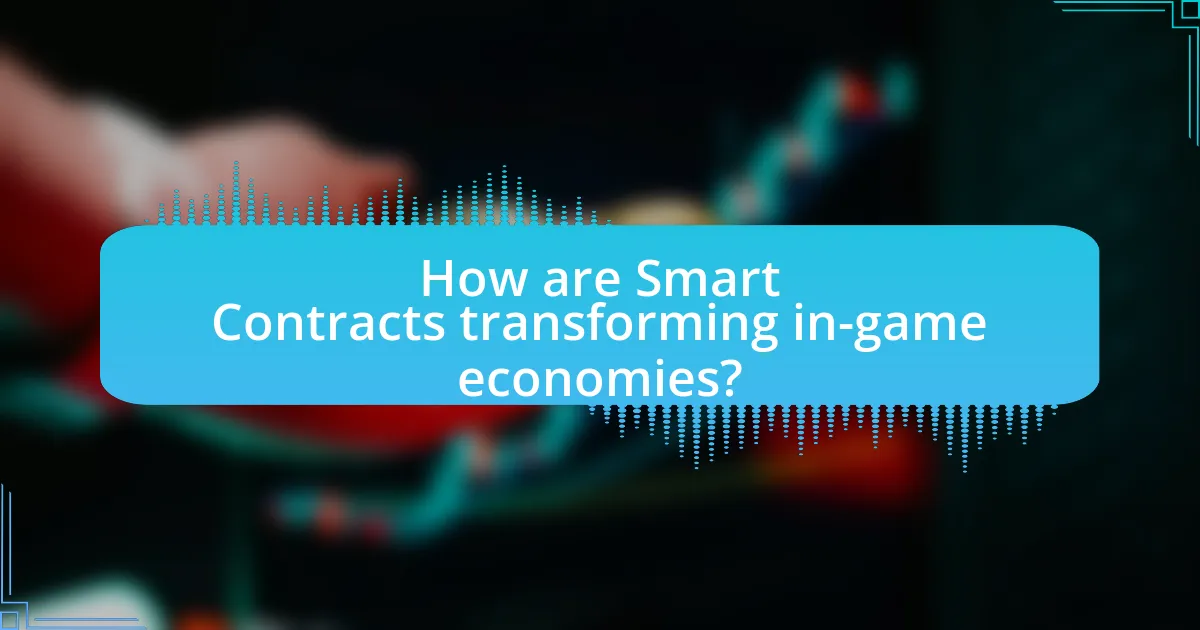
How are Smart Contracts transforming in-game economies?
Smart contracts are transforming in-game economies by enabling decentralized and transparent transactions, which enhance player ownership and reduce fraud. These self-executing contracts automate in-game asset exchanges, allowing players to buy, sell, or trade items securely without intermediaries. For instance, blockchain-based games like Axie Infinity utilize smart contracts to facilitate real-time transactions, ensuring that players retain true ownership of their digital assets. This shift not only empowers players but also creates new revenue streams for developers through transaction fees and secondary markets, as evidenced by the $1 billion in sales generated by Axie Infinity in 2021.
What new economic models are emerging from Smart Contracts?
New economic models emerging from smart contracts include decentralized finance (DeFi) ecosystems, play-to-earn (P2E) gaming, and tokenized asset ownership. These models leverage smart contracts to automate transactions, enforce rules, and facilitate trustless interactions among users. For instance, in P2E gaming, players earn cryptocurrency or tokens through gameplay, which can be traded or sold, creating a real-world economic incentive. Additionally, tokenized asset ownership allows players to have verifiable ownership of in-game items, enhancing their value and marketability. According to a report by DappRadar, the P2E gaming sector saw a significant increase in user engagement, with over 1.2 million daily active users in 2021, demonstrating the viability of these new economic models.
How do Smart Contracts facilitate player-to-player transactions?
Smart contracts facilitate player-to-player transactions by automating and securing the exchange of digital assets without the need for intermediaries. These self-executing contracts operate on blockchain technology, ensuring that transactions are transparent, immutable, and trustless. For instance, when a player wants to sell an in-game item, the smart contract verifies the ownership and conditions of the sale, automatically transferring the item to the buyer upon receipt of payment. This process minimizes the risk of fraud and enhances efficiency, as evidenced by platforms like Ethereum, where numerous gaming applications utilize smart contracts to streamline transactions and maintain a fair in-game economy.
What impact do Smart Contracts have on virtual asset ownership?
Smart contracts significantly enhance virtual asset ownership by providing automated, transparent, and secure transactions. They enable users to establish clear ownership rights and facilitate the transfer of assets without the need for intermediaries, thereby reducing the risk of fraud. For instance, in blockchain-based gaming, smart contracts can automatically execute the transfer of in-game items when certain conditions are met, ensuring that ownership is accurately recorded on the blockchain. This technology also allows for the creation of unique, verifiable digital assets, such as non-fungible tokens (NFTs), which represent ownership of specific virtual items, further solidifying the concept of ownership in digital environments.
How do Smart Contracts address issues in traditional gaming economies?
Smart contracts address issues in traditional gaming economies by automating transactions and ensuring transparency in asset ownership. They eliminate the need for intermediaries, reducing the risk of fraud and enhancing trust among players. For instance, smart contracts can facilitate secure in-game purchases and trades, allowing players to retain true ownership of their digital assets, which is often not the case in traditional gaming models where developers control the assets. Furthermore, smart contracts can implement decentralized governance, enabling players to have a say in game development and economic decisions, thus fostering a more engaged community. This shift towards decentralized systems has been supported by the rise of blockchain technology, which provides a secure and immutable ledger for all transactions, ensuring that players can verify ownership and transaction history without relying on a central authority.
What challenges do developers face without Smart Contracts?
Developers face significant challenges without smart contracts, primarily due to the lack of automation and trustless transactions. Without smart contracts, developers must rely on traditional centralized systems, which can lead to increased operational costs, slower transaction speeds, and higher risks of fraud. For instance, in gaming, the absence of smart contracts means that in-game asset ownership cannot be securely verified on a blockchain, making it easier for malicious actors to exploit vulnerabilities. Additionally, developers miss out on the ability to create decentralized applications that can operate autonomously, limiting innovation and scalability in gaming economies.
How do Smart Contracts mitigate fraud and exploitation in gaming?
Smart contracts mitigate fraud and exploitation in gaming by automating and enforcing game rules through immutable code on a blockchain. This technology ensures that all transactions and interactions within the game are transparent, verifiable, and tamper-proof, significantly reducing the risk of cheating and unauthorized modifications. For instance, in games utilizing smart contracts, players can trust that in-game assets, such as skins or currencies, are securely managed and cannot be altered by developers or other players without consensus. The decentralized nature of blockchain technology further enhances security, as it eliminates single points of failure and makes it difficult for malicious actors to manipulate the system.
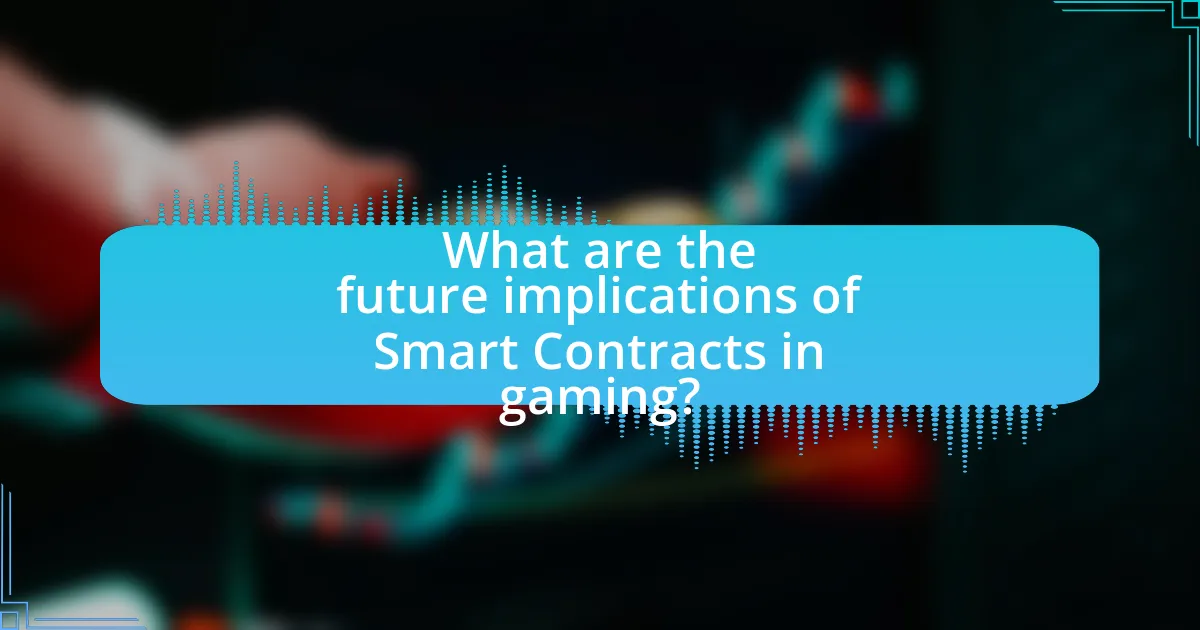
What are the future implications of Smart Contracts in gaming?
Smart contracts will significantly enhance transparency, security, and efficiency in gaming by automating transactions and enforcing rules without intermediaries. This technology allows for decentralized ownership of in-game assets, enabling players to trade, sell, or utilize their items across different games seamlessly. For instance, the integration of smart contracts can facilitate true ownership of digital assets, as seen in blockchain-based games like Axie Infinity, where players can earn real income through gameplay. Additionally, smart contracts can streamline game development by automating revenue sharing among developers, artists, and other stakeholders, thus fostering a more equitable ecosystem.
How might Smart Contracts evolve in the gaming industry?
Smart contracts are likely to evolve in the gaming industry by enabling decentralized ownership of in-game assets and facilitating automated transactions. This evolution will allow players to truly own their digital items, as smart contracts can verify ownership on a blockchain, ensuring that assets are unique and transferable without the need for intermediaries. For instance, the integration of non-fungible tokens (NFTs) in games has already demonstrated how smart contracts can create verifiable scarcity and provenance for in-game items, enhancing their value. Additionally, smart contracts can automate in-game transactions, such as rewards distribution and player agreements, streamlining processes and reducing fraud. The rise of blockchain gaming platforms, such as Axie Infinity, showcases the potential for smart contracts to transform traditional gaming economies into more transparent and player-driven ecosystems.
What trends are shaping the future of Smart Contracts in gaming?
The future of Smart Contracts in gaming is being shaped by trends such as increased decentralization, enhanced interoperability, and the rise of play-to-earn models. Decentralization allows players to have greater control over their in-game assets, as Smart Contracts facilitate direct ownership and transfer without intermediaries. Enhanced interoperability enables different games and platforms to interact seamlessly, allowing assets to be used across multiple environments, which is supported by blockchain technologies like Ethereum. The play-to-earn model incentivizes players by allowing them to earn real-world value from their in-game activities, driving engagement and investment in gaming ecosystems. These trends are supported by the growing adoption of blockchain technology in the gaming industry, with reports indicating that the global blockchain gaming market is expected to reach $50 billion by 2025, highlighting the significant impact of Smart Contracts on the future of gaming.
How can developers prepare for the integration of Smart Contracts?
Developers can prepare for the integration of Smart Contracts by gaining a thorough understanding of blockchain technology and the specific programming languages used for Smart Contracts, such as Solidity for Ethereum. Familiarity with decentralized applications (dApps) and the underlying principles of cryptographic security is essential, as Smart Contracts operate in a trustless environment where code execution is paramount. Additionally, developers should engage in hands-on practice by creating and testing Smart Contracts in a controlled environment, utilizing platforms like Remix or Truffle. This practical experience will help them identify potential pitfalls and optimize contract performance. Furthermore, staying updated with the latest developments in blockchain protocols and regulatory frameworks will ensure that developers can create compliant and efficient Smart Contracts that enhance in-game economies.
What best practices should developers follow when implementing Smart Contracts?
Developers should follow several best practices when implementing Smart Contracts to ensure security, efficiency, and reliability. First, they must conduct thorough testing and audits of the Smart Contracts to identify vulnerabilities, as evidenced by the high-profile hacks in the Ethereum ecosystem, which often stemmed from untested code. Second, developers should use established libraries and frameworks, such as OpenZeppelin, which provide secure and audited components, reducing the risk of introducing flaws. Third, they should implement proper access controls and permissions to prevent unauthorized actions, as seen in cases where lack of access management led to significant financial losses. Additionally, developers should ensure that Smart Contracts are designed to be upgradeable, allowing for future improvements and bug fixes without losing the existing state or data. Finally, clear documentation and adherence to coding standards are essential for maintainability and collaboration, as highlighted by the need for transparency in decentralized applications.
How can developers ensure the security of Smart Contracts in games?
Developers can ensure the security of smart contracts in games by implementing rigorous testing and auditing processes. Conducting comprehensive unit tests, integration tests, and using formal verification methods helps identify vulnerabilities before deployment. Additionally, engaging third-party security firms for audits can provide an external perspective on potential weaknesses. According to a report by ConsenSys, 70% of smart contract vulnerabilities arise from coding errors, highlighting the importance of thorough testing and expert reviews in mitigating risks.
What common pitfalls should developers avoid with Smart Contracts?
Developers should avoid common pitfalls such as inadequate testing, lack of security audits, and poor documentation when working with smart contracts. Inadequate testing can lead to vulnerabilities that may be exploited, as evidenced by the DAO hack in 2016, where a flaw in the smart contract code resulted in a loss of $60 million. Lack of security audits increases the risk of undetected bugs, which can compromise the integrity of the contract. Additionally, poor documentation can hinder future maintenance and updates, making it difficult for other developers to understand the contract’s functionality. These pitfalls can significantly impact the reliability and security of smart contracts in gaming applications.

